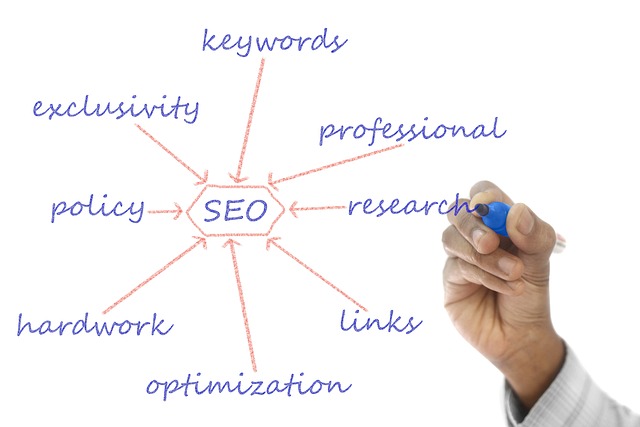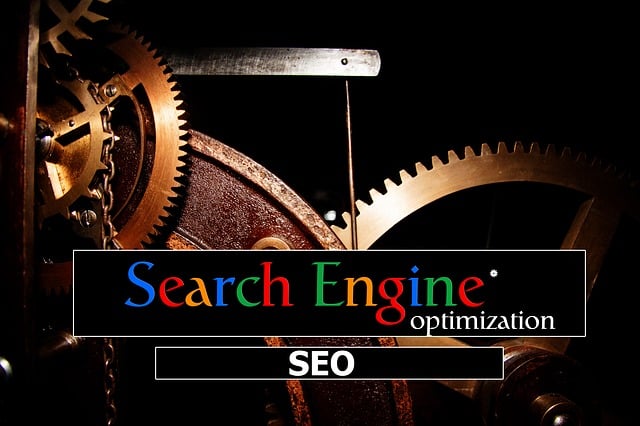Enterprise SEO is a powerful strategy for businesses aiming industry dominance in the competitive digital marketing arena. It involves tailored growth plans addressing unique challenges of large-scale operations, including keyword research, content creation, technical optimizations, strategic link building, and data analytics. Keyword research identifies user behavior insights and informs content optimization. On-page element optimization boosts rankings through strategic keyword integration. High-quality backlink building enhances trust with search engines. Technical SEO improvements enhance user experiences and drive organic traffic. Content marketing establishes thought leadership and long-term brand awareness. KPI analysis tracks progress and guides strategy adjustments. Adaptability is crucial, with regular updates to stay relevant amidst evolving algorithms and user behaviors.
In today’s digital landscape, Enterprise SEO growth plans are vital for staying competitive. This comprehensive guide explores strategic SEO growth strategies tailored for large-scale businesses. We begin by dissecting unique challenges in enterprise SEO and highlighting the importance of keyword research for targeted growth. From on-page optimization to building high-quality backlinks and leveraging technical SEO, each step enhances visibility. Content marketing and algorithm updates are also addressed, providing a roadmap for continuous improvement and long-term success in an ever-evolving digital environment.
Understanding Enterprise SEO and its Unique Challenges

In the dynamic landscape of digital marketing, Enterprise SEO stands as a robust yet intricate strategy for businesses aiming to dominate their industry. Unlike standard SEO practices tailored for smaller scales, Enterprise SEO deals with the unique challenges of large-scale operations, where brands often have extensive online presences and face stiff competition. These enterprises require sophisticated growth plans that account for multiple websites, diverse product portfolios, and complex customer journeys.
Effective SEO Growth Strategies for enterprises involve a multifaceted approach. It entails comprehensive keyword research to identify high-value terms specific to the company’s niche, ensuring relevant content creation. Additionally, technical optimizations are crucial, addressing site architecture, speed, and mobile responsiveness to enhance user experience. Link building becomes strategic, focusing on high-authority domains within relevant industries. Moreover, enterprise SEO leverages data analytics to track performance, enabling continuous refinement of strategies for sustained growth.
Conducting a Comprehensive Keyword Research for Targeted Growth

Keyword research forms the foundation of any successful SEO growth strategy. It involves identifying relevant search terms that potential customers use to find products or services similar to yours. By conducting thorough keyword research, businesses can gain valuable insights into user behavior and tailor their content accordingly. This process helps in targeting the right audience, ensuring that SEO efforts are focused on high-value keywords with significant search volume.
Comprehensive keyword research includes analyzing both short-tail and long-tail keywords. Short-tail keywords are more general and competitive but carry a higher search volume. Long-tail keywords, though less voluminous, are highly specific and often indicate a user’s intent to purchase or take a specific action. Incorporating these keywords into your website content, meta tags, and backlink strategy can significantly boost your search engine rankings and drive targeted traffic.
Optimizing On-Page Elements for Enhanced Visibility

In the realm of Enterprise SEO Growth Plans, optimizing on-page elements is a cornerstone of successful search engine optimization (SEO) strategies. By refining key components within a webpage, businesses can significantly boost their online visibility and attract more organic traffic. This involves strategic keyword research to understand what terms potential customers are using in their searches and incorporating these keywords naturally throughout the content.
Additionally, on-page optimization includes enhancing titles, meta descriptions, and headings to make them compelling and informative. High-quality, unique content that provides value to users is also essential. These tactics work in harmony to create a user-friendly experience, encouraging visitors to engage longer and reducing bounce rates. As a result, search engines recognize these pages as valuable resources, leading to improved rankings and driving effective SEO growth strategies.
Building High-Quality Backlinks: Strategies for Enterprise Success

Building high-quality backlinks is a cornerstone of successful enterprise SEO growth strategies. It involves securing references from authoritative websites within your industry, demonstrating to search engines that your content is valuable and trustworthy. Effective strategies include creating comprehensive industry resources like e-books or whitepapers that other sites will be eager to link to. Additionally, engaging in guest blogging on reputable blogs can open doors for natural backlinks. Collaborating with influencers and industry leaders can also lead to mutually beneficial linking opportunities.
Diversifying your backlink portfolio is key. Aim for a mix of links from high-authority domains as well as relevant, mid-sized sites. This balance signals to search engines that your brand enjoys widespread recognition and credibility. Remember, quality trumps quantity; one highly relevant and powerful link can have more impact than numerous low-quality ones. Continuously monitor your backlink profile to ensure its health and remove any toxic links that could negatively affect your SEO rankings.
Leveraging Technical SEO for Seamless User Experience

In today’s digital landscape, Technical SEO plays a pivotal role in ensuring a seamless user experience. Optimizing website structure, improving site speed, and implementing structured data markup are essential components of an effective Enterprise SEO Growth Plan. These strategies not only enhance search engine visibility but also significantly impact user engagement and retention. For instance, faster loading times can reduce bounce rates and encourage visitors to explore more pages, thereby increasing the likelihood of conversions.
By addressing technical SEO aspects, businesses can create a robust foundation for their online presence. This includes ensuring mobile-friendliness, as the majority of internet traffic now comes from mobile devices. Additionally, regular audits and updates to fix broken links, optimize meta tags, and improve crawlability are crucial steps in keeping your site aligned with search engine algorithms. These SEO growth strategies not only attract more organic traffic but also foster a positive user experience that encourages repeat visits and builds brand loyalty.
Implementing Content Marketing for Long-Term SEO Gains

Implementing content marketing is a strategic move within any robust enterprise SEO growth plan, offering long-term benefits that extend far beyond immediate traffic spikes. By creating and distributing valuable, relevant, and consistent content, businesses can attract and retain a clearly defined audience, establishing themselves as thought leaders in their industry. This approach not only helps build brand awareness and credibility but also provides the foundation for stronger search engine rankings over time.
SEO growth strategies that prioritize content marketing encourage organic reach by understanding and catering to the information needs of potential customers. Regularly updating websites with high-quality articles, blog posts, infographics, or videos signals to search engines that the site is active and authoritative, prompting algorithms to favor it in search results. Moreover, this approach fosters user engagement, encouraging shares, comments, and backlinks, further bolstering the site’s SEO profile.
Analyzing and Tracking Progress: Metrics for Measuring Success

Analyzing progress is a critical component of any successful SEO growth strategy. Businesses should establish key performance indicators (KPIs) to track their journey towards organic search dominance. These metrics can include website traffic, click-through rates, conversion rates, and bounce rates – all essential data points that provide insight into how users interact with the site. By setting benchmarks and regularly monitoring these KPIs, enterprises gain a clear understanding of what’s working and where improvements are needed within their SEO growth plans.
Effective tracking involves utilizing analytics tools like Google Analytics to capture real-time data. This enables businesses to make data-driven decisions, adjust strategies accordingly, and ultimately, enhance their online visibility and attract more organic traffic. Regular analysis allows for a proactive approach, ensuring the SEO efforts remain aligned with the desired goals and keeping the enterprise ahead of the competition in the ever-evolving digital landscape.
Staying Ahead of Algorithm Updates: Adapting Your SEO Growth Plan

In the dynamic landscape of digital marketing, search engine optimization (SEO) professionals must remain agile to stay ahead of the curve. Regularly updating SEO growth plans is crucial in response to algorithm changes that can significantly impact rankings. As search engines like Google continually refine their algorithms, what works today might not guarantee success tomorrow. Staying informed about these updates and adjusting your strategies accordingly is a vital part of sustaining online visibility.
Algorithm updates often reflect evolving user behaviors and preferences, making it essential for businesses to adapt their SEO growth plans. For instance, a shift towards voice search or increased emphasis on mobile-friendly content necessitates changes in keyword research, content optimization, and site architecture. By integrating these new trends into your strategies, you can ensure that your enterprise remains competitive and relevant in the ever-changing digital realm.
